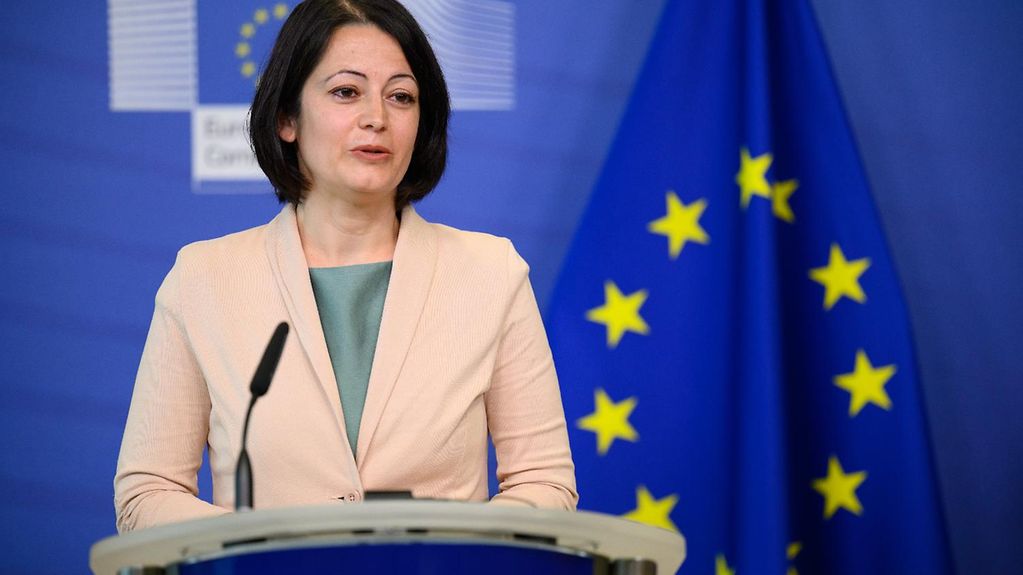Interview with first EU Youth Coordinator
Biliana Sirakova from Bulgaria is the EU’s first youth coordinator. In this interview, she talks about her new role and the opportunities available to young people in the EU to spend time abroad – whether to learn, work or volunteer. Her advice to young people: “Do it!”
4 min reading time

Biliana Sirakova took up her position as the first EU Youth Coordinator on 1 June.
Photo: Europäische Union, 2021/Christophe Licoppe
Ms Sirakova, you are the first youth coordinator in the EU. What do you recommend for young people who want to learn more about and participate fully in the EU?
Biliana Sirakova: I recommend that young people start with the European Youth Portal. There they will find information about opportunities to learn, work and volunteer in Europe and beyond. They will learn how to participate as citizens, how to propose a new EU law or have their say in an open consultation, and how to take part in the EU Youth Dialogue. The upcoming European Youth Event will help young people find out about the various EU funding opportunities for them.
As you can see, there are many ways to engage with the EU. It is crucial that young people discover how they can be active European and global citizens and become involved. The slogan of the 2021 European Youth Week, “Our future in our hands”, captures it well – by speaking up and getting involved, young people can become the architects not only of their own lives, but of a better future for Europe.
- The European Youth Portal provides information about the opportunities offered by the EU for young people.
- In addition, the European Youth Event EYE2021 is due to be held on 8 and 9 October in Strasbourg. Here, young people from all over Europe will exchange ideas about the future of Europe.
- EYE2021 also marks the culmination of the European Parliament’s youth consultation process for the Conference on the Future of Europe. The conference also has an online platform that gives young people the opportunity to help shape the future of Europe.
How do you want to enhance EU programmes such as Erasmus+, DiscoverEU or the European Solidarity corps?
Biliana Sirakova: The new Erasmus+ and the European Solidarity Corps programmes (2021-2027) were launched this year. The priorities for these programmes are:
- Promoting inclusion and diversity
- Adopting ‘green' practices across projects and activities
- Supporting the digital transition
- Encouraging participation of young people in democratic processes and civic engagement.
What impact has the Corona pandemic had on the programmes and what are you trying to do to counteract any difficulties encountered?
Biliana Sirakova: The pandemic and the resulting measures, such as travel bans, had a negative effect on the programmes, in that a number of projects simply could not take place. The Commission took mitigating measures in 2020 to assist organisations and individuals participating in both Erasmus+ and the European Solidarity Corps. These included extending deadlines and the duration of ongoing projects, replacing some physical activities by virtual activities and regularly communicating via FAQs, factsheets and online platforms, to give just a few examples.
Why was it necessary to create the position of a European youth coordinator?
Biliana Sirakova: There was a need for a visible reference point, someone who could build on existing relationships with youth stakeholders and develop new ones. In my role, I will promote participation in the programmes. I will be sharing any lessons related to youth engagement with Commission departments where relevant, and looking for synergies with other programmes and priorities.
Have you ever participated in any of the EU programmes? If you have, what can you say about the experience?
Biliana Sirakova: I had graduated from university before my home country, Bulgaria, joined the EU in 2007. Therefore, I was not eligible, at that time, to participate in any of the EU youth programmes. However, I can vouch for the benefits of student mobility schemes. In 10th grade, I won one of the Open Society’s scholarships and studied for a semester in the US. While completing my university studies in the US, I took part in a mobility scheme, very similar to Erasmus+ and studied for 6 months at the Universidad de Salamanca in Spain.
For me, living and studying abroad was one of, if not, the most, influential factor in developing as a person and as a professional. I see enormous value in experiencing different cultures, languages, mindsets and ways of living. To any young person out there, considering spending time abroad whether it is for learning, volunteering or working, I can only say ‘Go for it!’; it may be a challenging experience, but in a good way. It can disrupt your routines and life, but will, in return, broaden your perspective, create change and opportunities.